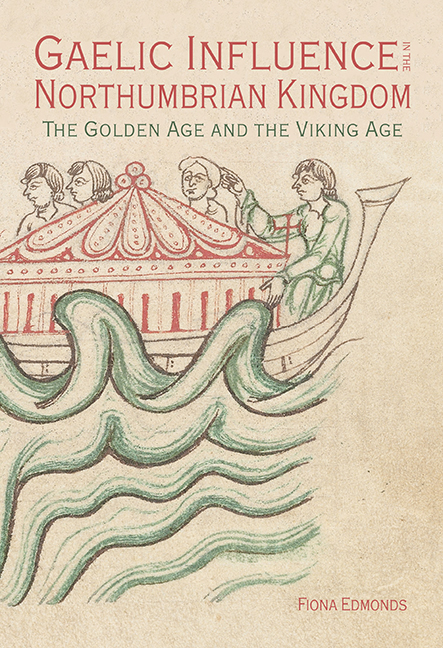Book contents
- Frontmatter
- Contents
- List of Illustrations
- Acknowledgements
- List of Abbreviations
- Preface: An Eventful Voyage
- 1 Concepts and Historiography of the Northumbrian and Gaelic Worlds: Medieval to Modern
- 2 Exiles and Emperors: Gaelic-Northumbrian Political Relations in the Golden Age
- 3 Fragmentation and Opportunity: From the Eighth Century to the Viking Age
- 4 Pathways through the Past: Routes between the Gaelic World and the Northumbrian Kingdom
- 5 A Golden Age of Ecclesiastical Contacts
- 6 Saints and Seaways in the Viking Age
- 7 Medieval Multilingualism: Gaelic Linguistic Influence in the Northumbrian Kingdom
- 8 Movement and Material Culture in the Northumbrian and Gaelic Worlds
- Conclusion: Individuals and Influences
- Bibliography
- Index
- STUDIES IN CELTIC HISTORY
7 - Medieval Multilingualism: Gaelic Linguistic Influence in the Northumbrian Kingdom
Published online by Cambridge University Press: 28 February 2020
- Frontmatter
- Contents
- List of Illustrations
- Acknowledgements
- List of Abbreviations
- Preface: An Eventful Voyage
- 1 Concepts and Historiography of the Northumbrian and Gaelic Worlds: Medieval to Modern
- 2 Exiles and Emperors: Gaelic-Northumbrian Political Relations in the Golden Age
- 3 Fragmentation and Opportunity: From the Eighth Century to the Viking Age
- 4 Pathways through the Past: Routes between the Gaelic World and the Northumbrian Kingdom
- 5 A Golden Age of Ecclesiastical Contacts
- 6 Saints and Seaways in the Viking Age
- 7 Medieval Multilingualism: Gaelic Linguistic Influence in the Northumbrian Kingdom
- 8 Movement and Material Culture in the Northumbrian and Gaelic Worlds
- Conclusion: Individuals and Influences
- Bibliography
- Index
- STUDIES IN CELTIC HISTORY
Summary
The political, ecclesiastical and cultural interactions that I have outlined so far brought speakers of different languages into contact. In this chapter, I investigate the evidence for Gaelic linguistic influence in the Northumbrian kingdom, tracing several different channels and chronological contexts. Bede's famous depiction of King Oswald's collaboration with Bishop Áedán provides some insight into the theme:
atque eius ammonitionibus humiliter ac libenter in omnibus auscultans, ecclesiam Christi in regno suo multum diligenter aedificare ac dilatare curauit. Ubi pulcherrimo saepe spectaculo contigit, ut euangelizante antistite, qui Anglorum linguam perfecte non nouerat, ipse rex suis ducibus ac ministris interpres uerbi existeret caelestis; quia nimirum tam longo exilii sui tempore linguam Scottorum iam plene didicerat.
and humbly and willingly in all cases giving ear to his (Áedán’s) admonitions, he (the king) industriously applied himself to build and extend the Church of Christ in his kingdom; wherein, when the bishop, who was not skilful in the English tongue, preached the gospel, it was most delightful to see the king himself interpreting the word of God to his commanders and ministers, for he had perfectly learned the language of the Scotti during his long banishment.
Bede's portrayal of this partnership drew on biblical models of Christian kingship and a Gregorian vision of the episcopal life. Oswald's translation of the sermon was in line with St Paul's approach: ‘If I do not know the meaning of the language, I shall be a foreigner to the speaker and the speaker a foreigner to me.’ The portrayal of Oswald and Áedán as Gaelic speakers seems realistic given that both men had spent time in Argyll and Ireland, but how common was this experience in the Northumbrian kingdom? Did the two men belong to a wider Gaelic-speaking community, or were they members of a small, mobile group of noblemen and clerics?
There is a burgeoning scholarship on medieval multilingualism, which tackles the theme from various angles. Scholars have studied texts in search of terms borrowed from other languages, and analysed the circumstances in which vocabulary was borrowed or adapted.5 The influence of texts composed in different linguistic milieus is a topic of enduring interest, as noted already in relation to Cogad Gáedel re Gallaib and the postulated Brjáns saga, a lost Norse text that was later incorporated into Njáls saga.
- Type
- Chapter
- Information
- Gaelic Influence in the Northumbrian KingdomThe Golden Age and the Viking Age, pp. 155 - 184Publisher: Boydell & BrewerPrint publication year: 2020



